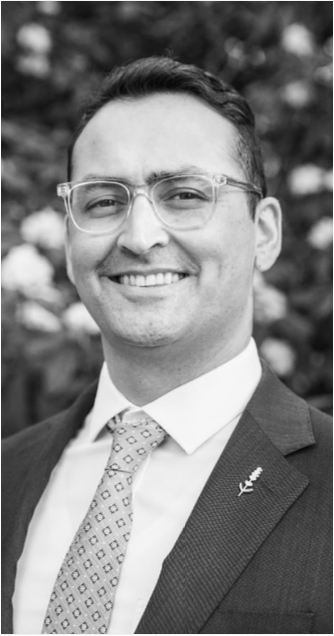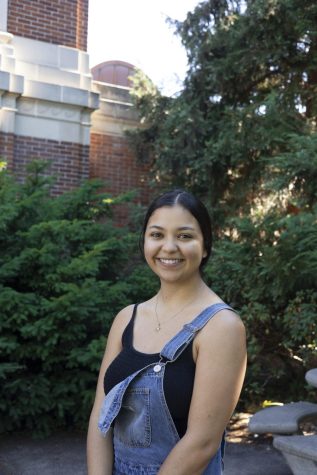Scott Vignos selected as new Chief Diversity officer
Contributed by Julian McFadden
Contributed portrait of Scott Vignos taken by photographer, Julian McFadden
January 17, 2023
Editor’s note: Quotes have been edited from a previous version of this story, they have since been corrected. We apologize for the error.
“This is not work that you can stop, or pause, or take your foot off the gas. It’s too important,” said Scott Vignos, Oregon State University’s new Chief Diversity Officer as of November 2022.
Vignos first moved to the university in 2015 and worked in what was previously named the Office of Equity and Inclusion working on civil rights compliance, issues surrounding title IX and Americans with Disabilities Act.
The office was later renamed to the Office of Institutional Diversity after a large-scale on-campus protest in November of 2015, only one month after Vignos’s arrival.
“What we heard as a community was testimonies from students about their experiences of racism, sexism and other forms of oppression while at OSU,” Vignos said.
Vignos was the first of two staff members to transfer into the new office. He has remained in the office since, working as the Director of Strategic Diversity, then the Assistant Vice President of Strategic Initiatives before finally taking over as the interim chief diversity officer in September 2021.
In his position he has begun plans to continue strides in retention of students with minoritized identities on campus. When he took the role during fall term of 2022, 30% of registered students reported identifying as a student of color.
“That’s a huge, huge increase even from even just ten years ago,” Vignos said. “What that says to me is while OSU is a (Predominantly White Institution), we are a PWI that is in a period of change and flux.”
Vignos also hopes to expand the support for students and community members outside of the expected Corvallis, Newport and Bend areas, including the Portland-metro area and rural areas in between.
Most importantly, Vignos says he knows that it will take persistent and extensive efforts to hear from BIPOC students about their experiences on campus.
“As an institution that I think has really strong ambitions to be a leader in a lot of different fields — things like sustainability and climate change and countering polarization — those require lots of different voices and lots of different ideas,” Vignos said. “We can’t keep doing the things that we’ve always been doing.”
Vignos’s past experience within the Office of Institutional Diversity was key for those who supported his application for the role. Despite serving as the interim Vice President and CDO, an offer for the position was between Vignos and one other candidate.
“I quickly understood his ability to think strategically and advance the Diversity Strategic Plan we created in 2017,” Alexander said. “He has the dispositions necessary to work closely with multiple stakeholders, to bring various communities together to address policies and practices that impact the success of all members of the university.”
Alexander and Vignos worked together for just over four years, creating the Diversity Strategic Plan, which is a five-year plan that “recognizes that creating inclusive excellence and advancing the university’s mission and values go hand in hand,” according to the university website.
“He understands the impact of repression in all its forms and the right to freedom of expression as a core institutional value,” Alexander said.
Vignos, who grew up in the twin cities of Minnesota — the Minneapolis and St. Paul area — to two parents: one who immigrated into the U.S. from India and the other a working-class first-generation college graduate. He describes himself having grown up in “the inbetween,” being of mixed-faith as well as mixed race.
“It really allowed me to see some of the issues that I worked on a lot now from these multiple vantage points, because I was sort of living it in those multiple vantage points,” Vignos said.
He says another moment that continued to push him forward was coming out as gay when he was in college. He moved to OSU in 2015 when his husband got a job teaching within the College of Public Health.
“My background in that area — and just my own family history — helped me inform my perspective,” Vignos said. “It also engendered a lot of humility. I know I don’t have all of the lived experiences of folks who experience discrimination. That means that I really have to build and be in strong relationships with individuals so that I can best understand how to be a good advocate and ally.”


















































































![Newspaper clipping from February 25, 1970 in the Daily Barometer showing an article written by Bob Allen, past Barometer Editor. This article was written to spotlight both the student body’s lack of participation with student government at the time in conjunction with their class representatives response. [It’s important to note ASOSU was not structured identically to today’s standards, likely having a president on behalf of each class work together as one entity as opposed to one president representing all classes.]](https://dailybaro.orangemedianetwork.com/wp-content/uploads/2025/03/Screenshot-2025-03-12-1.00.42-PM-e1741811160853.png)

























